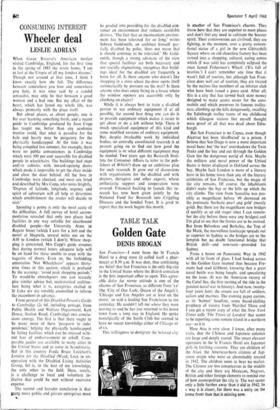Golden Gate
TABLE TALK DENIS BROGAN
San Francisco—I went from the St Francis Hotel to a drug store (it called itself a phar- macy) at 8.30 a.m. It was shut, thus confirming my belief that San Francisco is the only big city in the United States where the British consulate is the first important office to open. This agree- able doke far niente attitude is one of the charms of San Francisco, so different from 'LA' (the 'City of Our Lady, Queen of the Angels'). 'Chicago and Los Angeles are at least on the move,' so said a leading San Franciscan to me yesterday. He couldn't tell me where they were moving to and he has just returned to his home town from a long stay in England. He spoke nostalgically of the Savile Club but seemed to have no recent knowledge either of Chicago or of LA.
This willingness to denigrate the beloved city Is another of San Francisco's charms. They know here that they are superior to most places and don't feel any need to cultivate the booster spirit. Their controversies are civilised; they are fighting, at the moment, over a pretty conven- tional statue of a girl in the new Ghirardelli Square where an old chocolate factory has been turned into a shopping, cultural, eating centre which (I was told) has completely eclipsed the once famed Fishermen's Wharf. ('It's full of tourists.') I can't remember any time that it wasn't full of tourists, but although San Fran- cisco does well out of tourists, they are treated by the natives like members of an inferior club who have been issued a guest card. After all, this is a city that has turned back state money designed to make access easier for the auto- mobile and which preserves its famous trolley- cars, climbing up the hills dangerously, recalling the Edinburgh trolley trams of my childhood which Glasgow visitors like myself thought were proof of all that was dead about Edin- burgh.
But San Francisco is no Capua, even though Alcatraz has been 'disaffected' as a prison. I believe That San Diego is now a more important naval base; but 'the war' overshadows the Twin Peaks and the bay and out through the Golden Gate lies the dangerous world of Asia. Maybe the military and naval power of the United States is better displayed in Oakland across the bay. Maybe Jack London is more of a literary hero in his home town than any of the literary celebrities of San Francisco, but the magic of the city remains, Of course, the inhabitants didn't make the bay or the hills up which the city climbs. The view from Sausalito was pos- sibly as magnificent before '49 showered on the peninsula 'barbaric pearl and gold' (mostly gold). But there are the magnificent new bridges (I qualify as an old stager since I can remem- ber the city before there were any bridges) and I'm glad to see that the ferries are to be revived.
But from Belvedere and Berkeley, the Top of the Mark, the marvellous landscape spreads out as superior to Sydney as the bridges are to the lumpish but no doubt functional bridge that British skill—and non-taste—provided for Sydney.
From a house on Panoramic Way in 1942 with all its front of glass, I had looked across to the Golden Gate (named thus because Fre- mont had read Gibbon), knowing that a great naval battle was being fought, and speculating on the issue. (It was the American victory of the Coral Sea, the first turning of the tide in the greatest naval war in history). And now, twenty- four years later, the streets are full of soldiers, sailors and marines. The evening paper carries, as its 'banner' headline, some blood-chilling prophecy of victory from. Marshal Thieu and I can get a recent copy of what the New York Times calls 'The Times of London' that seems to be reporting some remote island in a northern sea—as it is. • Here Asia is very close. I knew, after many visits, that the Chinese and Japanese colonies are large and deeply rooted. The smart elevator operators in the St Francis Hotel are Japanese girls in fetching costume. They are children of the Nisei, the American-born citizens of Jap- anese origin who were so abominably treated in 1942. The children seem to bear no malice.
The Chinese are less conspicuous in the middle of the city and there are Mexicans, Negroes, British and other foreign elements to remind one of how cosmopolitan the city is. The war seems only a little further away than it did in 1942. In a way it is closer, for there was a unity on the home front then that is missing now.














































 Previous page
Previous page